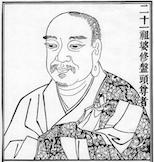Koso Wasan 14
The sages of the Tathagata's pure lotus
Are born transformed from the flower of perfect enlightenment;
Thus, the aspirations of sentient beings
Are swiftly and completely fulfilled there.
The Meaning of 'Other Power'

Other Power is none other than the power of the Tathagata's Primal Vow.1
The 'flower of perfect enlightenment' here refers to Amida Buddha's enlightenment. Following from the previous verse, Shinran Shonin is quoting almost verbatim from the Jodo Ron to speak of the result of the 'Power of the Vow'. These verses, which Shinran composed to praise Vasubandhu Bodhisattva, touch upon really basic and essential Buddhist themes. In the Jodo Ron, Vasubandhu introduces the possibility of utilising the Buddha's power (Sk. bala) as an adjunct to the attainment of realisation. Later on in this set of verses of the wasan collection, the topic of 'merit transference' eko Sk. parinama) is raised, and this is also an important part of the Buddhist 'world-view'.
It seems to me that it is possible to draw upon the power of the Buddha, not so much by intercession or request, as by participation in the process; by assent and engagement. It is, so to speak, a natural (jinen) processs, which does not violate the law of karma, simply because the law of karma cannot be violated. It is to draw on the Buddha's 'power' in the way a spacecraft draws on the gravity of a heavenly body to increase its velocity so that it can move out of the solar-system altogether.
By 'participation in the process' I mean that our intentions and motives are intertwined with those of the Buddha. 'Desire for birth' is an integral part of the Primal Vow, and as we shall see later, Amida's shinjin brings with it the desire for the enlightenment of others. The whole process is reciprocal; our enlightenment depends on the Buddha's and his on ours. 'I shall not be enlightened unless they are.'
To think about the Tathagata's power, perhaps we need to think about just what we mean by a 'Buddha'. Sometimes words, like 'deity' or even 'god' are used, but in the Buddhist context such terms are inappropriate. Neither is a Buddha a 'god' in the sense understood in theistic religions, which see their deity as a manifestation of - or at the heart of - a 'supreme being'. A Buddha is nothing more nor less than an enlightened teacher, although not a mere human being. The Buddha, who has made his power available to us is Amida Tathagata. He became a Buddha, as all Buddhas do, by working through a timeless path in which he maintained the perfect purity of the dharma; literally, the embodiment of dharma. Although he may have a human appearance, this is a way of reaching into our consciousness and of relating to us so that we can understand. Ultimately, supreme Buddha is beyond the comprehension of foolish beings.
Other Power only originates from Amida Buddha, and nowhere else. It is the power that reaches us, generates shinjin - the cause of liberation from birth and death - and embraces us.
Working and moving from one form of existence to another, from one environment to another through endless time, we have by association, by contact with the dharma come into a karmic relationship that eventually brings us into contact with an enlightened teacher, a Buddha. All that we are waiting for (as we shall see in the verses on Shan-tao) is a spark. It is like a match waiting to be struck. It is the Buddha's power that urges us to a moment of pure karmic consciousness - that is the purity which brings the karmic result of birth in the Pure Land. We see this happening during the life of Shakyamuni.
Over and over again Shakyamuni comes into contact with people and they come into contact with him - but this is not the first time they have met. Over and over again, these people experience a 'ripening' of karma (Sk. vikalpa) and a redeeming moment in which they 'see' - know total clarity of mind; and that flings them on to final release. Sometimes the cause is just seeing the Buddha, or listening to a sermon, or engaging in discussion with him.
The Buddha, then, is the agent of awakening, and this agency is Other Power. For Shinshu followers it is the moment of faith, shinjin - in which our hearts and minds are the Buddha's heart and mind -, which is the cause of birth. The Buddha, which for most of us takes the form Namo Amida Butsu, is the agent of this awakening. Often a catalyst is involved - a sutra, a sermon, a person, an event - occuring in the context of our nembutsu life. In any case it is faith sparked by the Buddha which is the cause of birth. The mechanism is 'merit transference', which we will be able to explore more fully in a later verse.
It is called 'Other Power' because it is experienced as not having been self-generated. You will remember Ajatashatru saying that shinjin had no origin in him.
1: CWS, p. 57.